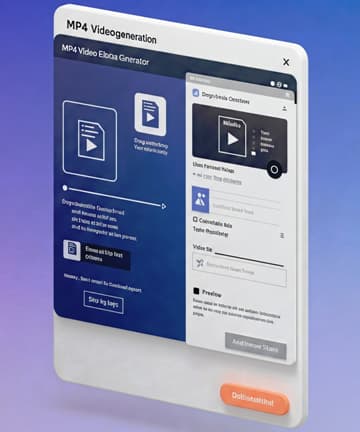🖼️ Online Image to Base64 Converter Free
Convert Images to Base64 Format in Seconds by Using Our Free Online Tool
Do you wish to encode images to Base64 format within seconds? We offers this tool advanced features to you an image to base64 converter tool that helps you to convert images easily instantly. You can be a web designer, blogger, or web developer; this tool provides you a straightforward way to encode images to Base64 format.
What is This Tool?
This is an image file converter based on the browser that will convert your image files to Base64 encoded strings. Base64 is a binary-to-text encoding scheme that encodes binary data in a printable ASCII string. When posting an image, the application reads the file and decodes into a text string that begins with "data:image/[format];base64,".
The tool accommodates all the standard image formats such as JPG, PNG, GIF, and WebP. The tool is purely browser-based, so your images never leave your device. This maintains total privacy and security for your files.
How Do You Use This Tool?
Our software is easy to utilize. You simply have to click the file input field and browse an image from your system. You can also drag and drop files into software. When a file is selected, the software will automatically show file details like name, size, and type.
The conversion occurs immediately. You get a preview of your image and the entire Base64 string in the output textarea. The tool also displays a success message upon completion of conversion.
To duplicate the encoded string for use, click on the "Copy to Clipboard" button. You can paste this Base64 code directly into your HTML, CSS, or wherever you want to use it. The "Clear All" button clears the tool for your next conversion.
Why is Base64 Encoding Important?
Base64 encoding is utilized for a number of crucial functions in web development and data processing. Firstly, it enables adding images to HTML or CSS without having to add them into individual image files. It minimizes HTTP requests and can facilitate the loading of small images.
Email clients also favor Base64 encoding because email servers handle text more efficiently than binary attachments. Some APIs also need Base64 encoded images when uploading or processing them. Base64 encoded images also come in handy when saving images in database or JSON data structures.
Base64 encoded images work in all browsers and platforms. They're especially useful if you need to embed images where file uploads are not an option or convenient.
Who Can Make Use of This Tool?
Base64 encoding is commonly used by web developers on icons, logos, and small images within their applications. It is particularly very useful when dealing with CSS sprites or minimizing server requests. API developers also need to encode images into Base64 for data transmission.
This tool can be utilized by the bloggers and content creators in order to embed images within file-uploading unsupported platforms. It can also be utilized while embedding images within email newsletters in a way that they get displayed uniformly across various email clients.
Web programmers engaged in web-related projects love the simplicity of encoding images in Base64. This is also very beneficial when coding for standalone HTML pages or prototypes that have no other sources of images than the current document.
Database administrators might have to store images in Base64 strings. It is an appropriate method for extremely small images such as profile images or thumbnails where keeping files is not feasible.
Technical Advantages and Consequences
Base64 encoding makes files about 33% bigger than the native binary size. That is usually an acceptable trade-off for very small images where convenience is more than a reasonable cost to pay in terms of larger size. Encoding is reversible and can be decoded back into original image at will.
Our utility does everything client-side with JavaScript's FileReader API. This results in quicker processing and complete privacy since files never upload to any server. Our utility offline-enabled once loaded and is therefore reliable for any scenario.
Generated Base64 strings contain the correct data URI scheme and are therefore directly usable in HTML img tags or CSS background-image declarations. No manual formatting and extra processing required.
Best Practice for Base64 Use of Images
Base64-encode images less than 10KB for best performance. Large pictures should generally stay in a different file so as not to bloat your CSS or HTML. Base64 is fine to use for icons, little logos, or plain ornaments that are very important to your layout.
Test Base64 images on multiple browsers and devices to display correctly at all times. Older versions of email clients may not be able to support Base64 images, so testing thoroughly in your target environment is crucial.
Keep your Base64 strings organized and, where feasible, use CSS custom properties or variables to contain them. This makes your code maintainable and simpler to update when the time comes.
Keep in mind that Base64 encoded images do not receive browser caching like regular image files. Resort to this format sparingly where the advantages outweigh the caching drawback.
This tool streamlines the whole process of Base64 conversion, available to the use of users of all technical abilities. Experiment with it on your images and enjoy the benefit of one-click Base64 encoding.





